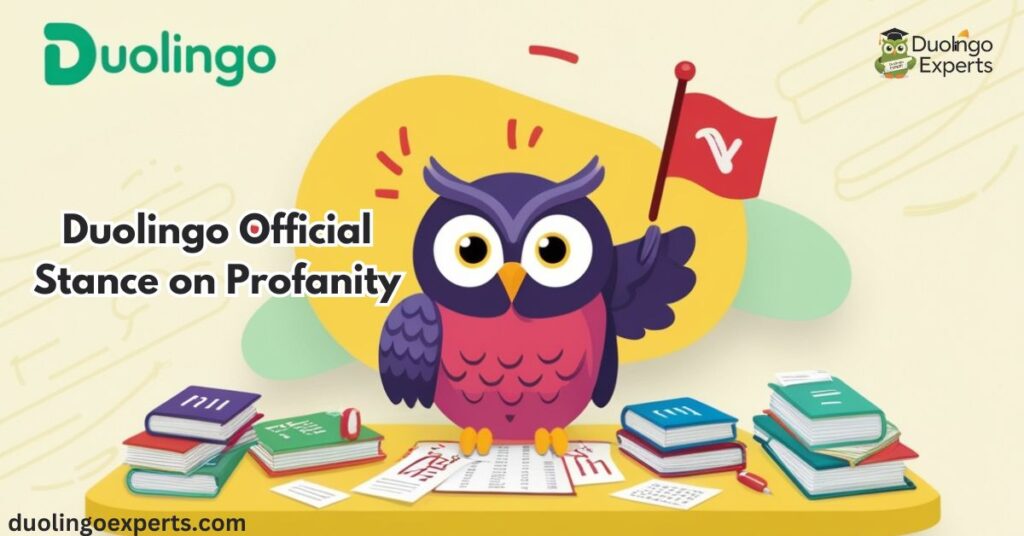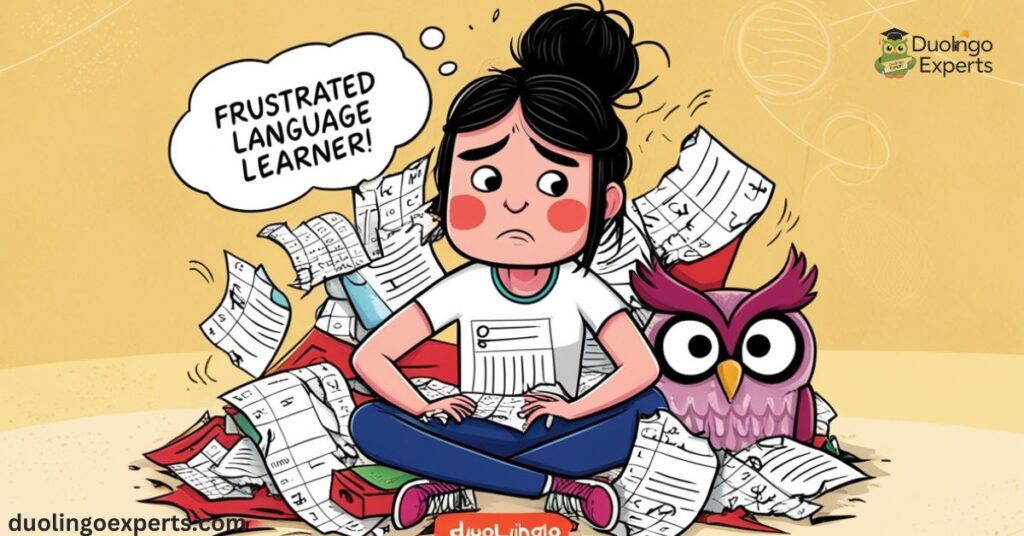Learning a new language can feel like stepping into another world. It’s not just about memorizing vocabulary; it’s about immersing yourself in the culture, the history, and the social dynamics that language carries with it. Many language learners are drawn to apps like Duolingo, which have simplified and gamified the learning process. But with so many resources available, some learners wonder, Does Duolingo teach curse words and profanity along with basic vocabulary and grammar? Does Duolingo include these words in its lessons, or is there a better platform for studying informal language?
In this comprehensive guide, we will dive deep into Duolingo’s stance on curse words and taboo language, explore how language apps approach informal language, and consider whether learning these words is essential for becoming fluent in a new language. We’ll look at Duolingo’s content policy, the cultural implications of using profanity, and alternatives available for learners who are particularly interested in studying slang or colloquial expressions.
Duolingo Official Stance on Profanity

Content Policy: Why Curse Words Are Excluded
When it comes to teaching a new language, Duolingo has a clear content policy designed to provide a safe, respectful, and user-friendly learning environment. As such, Duolingo avoids teaching curse words or profanity as part of its curriculum. Why? Because Duolingo’s mission is to make language learning accessible to people of all ages and backgrounds, and including offensive language could alienate certain users.
Duolingo believes that teaching standard language – words and phrases that are widely accepted across different contexts – is key to building a solid foundation for learners. By focusing on formal and neutral language, Duolingo avoids exposing learners to language that might be inappropriate or offensive, especially when used in the wrong context.
The platform’s goal is to help people converse effectively in everyday situations, whether they are traveling, working, or socializing. Swearing, however, is often not something learners need right away, especially in situations where they may encounter people from different cultures or communities who may interpret those words differently.
The Focus on Standard Language
Duolingo prioritizes teaching standard language – that is, non-taboo expressions that are suitable for general communication. This includes useful vocabulary and phrases that learners can immediately apply in practical conversations. For example, Duolingo teaches basic greetings, how to order food at a restaurant, how to ask for directions, and how to describe daily activities. These are essential skills for everyday life and are designed to help users communicate effectively in the real world.
One of Duolingo’s educational philosophies is that learning standard language helps build confidence in new learners, enabling them to form sentences that will be understood by native speakers regardless of the country or region they come from. For this reason, Duolingo avoids teaching slang, taboo expressions, or profanity that could confuse beginners or make them appear disrespectful.
Why People Want to Learn Curse Words
Cultural Immersion and Real-World Language
Though Duolingo keeps curse words out of its curriculum, many learners are interested in understanding how to use informal language, including swearing, as part of the cultural immersion process. Language is deeply connected to culture, and swearing can reveal a lot about the way people communicate in informal settings. For many learners, mastering curse words and slang allows them to feel more like they truly understand the culture behind the language.
For example, in countries where profanity is widely used in everyday conversation, knowing how to swear appropriately can help learners fit in. By understanding the emotional weight behind certain words, learners can avoid cultural missteps, knowing when it’s acceptable to use taboo language and when it’s not.
The Appeal of Taboo Language
Taboo language has a psychological appeal, especially to new learners. Words that are considered forbidden or off-limits often come with an emotional charge. Many learners are curious about curse words because they hold a sense of power, excitement, or rebellion. In some cases, learners want to understand swearing because it’s often part of humorous or intense conversations that give new learners a sense of belonging.
Furthermore, learners may see swear words as an opportunity to break the rules of language in a way that gives them more freedom to express themselves. Whether it’s in casual conversations with friends or in more heated situations, swearing offers a way for people to communicate strong emotions that regular words may not convey as effectively.
Influence of Media and Pop Culture
Movies, TV shows, and online content often feature characters using curse words to showcase the more informal side of language. Many learners are exposed to slang and profanity early in their language-learning journeys, especially when they watch foreign films or consume content online. This can spark an interest in learning how to use these words in conversation, leading people to search for language apps or websites that teach swearing or informal phrases.
However, the challenge comes in understanding the cultural context of such words. While profanity may be freely used in some places, it may be considered deeply offensive or inappropriate in others. This highlights the need for learners to be educated about when and where it’s suitable to use curse words, and that’s something Duolingo intentionally steers clear of in its lessons.
The Debate: Should Language Apps Teach Swear Words?
Arguments For Including Profanity
Realistic Language Acquisition: One of the biggest arguments for teaching curse words in language learning apps is that it provides a more authentic learning experience. Language learners who only learn formal, neutral language might struggle when they encounter more informal conversations, which often contain slang and taboo expressions. Swearing, in many languages, is a part of the natural flow of conversation and understanding how and when to use these words can lead to a more complete grasp of the language.
Understanding Cultural Context and Social Nuances: Profanity is often deeply tied to social norms and cultural context. In some languages, swear words can serve to express affection, frustration, humor, or even solidarity among friends. Being aware of how curse words function in various social situations can make learners more aware of the intricacies of language, thus improving their ability to navigate social dynamics.
For example, in some cultures, people might use swear words in a playful way among close friends, but it could be seen as highly disrespectful if used in a professional or formal context. Learning the context of these words is essential to prevent misunderstandings and social faux pas.
Arguments Against Teaching Curse Words
Risk of Misuse: One of the primary concerns of teaching curse words is the potential for misuse. Learners who don’t fully understand the cultural significance of certain words may unintentionally offend someone. For instance, using an inappropriate swear word in the wrong context – such as a workplace or formal gathering – can lead to serious social consequences. Language apps like Duolingo are committed to minimizing these risks by avoiding teaching words that can easily be misused.
Maintaining a Safe Learning Environment: Duolingo, like many other educational apps, strives to create a safe, welcoming space for learners of all ages, including children. Including profanity could alienate some users or make them feel uncomfortable, especially in a family-friendly context. The idea is to make language learning inclusive, without causing offense or discomfort to anyone.
Furthermore, teaching learners that certain words are off-limits or inappropriate can help prevent them from inadvertently causing harm. This aligns with Duolingo’s overall mission of promoting kindness, respect, and understanding.
Alternatives to Learning Curse Words on Duolingo

Slang-Focused Language Apps
If you’re particularly interested in learning more about slang or curse words, there are other language apps designed to focus on informal language. These apps cater to learners who want to dive deeper into colloquial expressions and taboo language. Here are a few alternatives to Duolingo:
- Memrise: Memrise includes informal phrases, regional slang, and sometimes even profanity in its lessons. This is a great alternative for those looking to expand beyond formal vocabulary.
- Babbel: Babbel teaches conversational language and covers some colloquial expressions, although it does not focus heavily on curse words.
- HelloTalk: HelloTalk allows users to chat with native speakers, making it a good platform for learning how real people use language, including swear words and informal language.
Online Resources for Learning Colloquial Language
In addition to language apps, there are websites and online communities where you can learn slang and taboo expressions. Some popular options include:
- Urban Dictionary: This user-generated platform is dedicated to defining slang terms, including curse words and other informal phrases.
- Reddit Subreddits: Subreddits like r/languagelearning often contain threads where users discuss colloquial speech, slang, and informal expressions.
The Role of Curse Words in Language Learning
Cultural Context and Appropriateness
Learning curse words is not just about memorizing a set of expressions. It’s about understanding cultural context and the appropriate settings in which to use them. Swearing can be an important tool for expressing frustration, humor, or deep emotion, but it’s crucial to understand when it’s appropriate to use those words and when it’s best to avoid them.
Many learners focus on learning curse words because they want to better understand how people communicate in different settings. However, knowing when not to use them is equally important. A common mistake is to overuse swear words in an attempt to sound more fluent, without realizing that it can damage relationships or create misunderstandings.
The Risks of Misusing Profanity
Misusing profanity is one of the most significant risks for language learners. In many cases, swearing is part of the cultural fabric, but it can also be highly offensive. For example, using curse words with a stranger or in a formal setting could lead to awkward moments or social rejection.
Learners must also be careful when using slang or informal expressions in professional or formal contexts. Not every person you meet will be comfortable with the same level of informal language, and making a mistake can cost you credibility.
Duolingo Approach to Colloquial Language

Informal Phrases and Expressions
Though Duolingo avoids teaching curse words, it does teach informal expressions that are useful in day-to-day conversation. These phrases, while not as offensive as swear words, are still important for learners to understand. Phrases like “How’s it going?” or “What’s up?” are often used in casual conversations and help learners engage with native speakers on a friendly, informal level.
The Balance Between Formal and Informal Language
Duolingo strives to maintain a balance between teaching formal language for professional settings and informal language for casual interactions. By sticking to neutral phrases that are universally understood, Duolingo ensures that learners gain a versatile foundation in language.
However, Duolingo also introduces learners to conversational language – including slang, but with a focus on politeness and respect. This
approach allows users to be socially aware while still enjoying the flexibility of using everyday expressions when they become more comfortable.
Frequently Asked Questions
What does Duolingo not teach?
Duolingo does not teach curse words or profanity, focusing instead on formal, everyday language suitable for general conversation. It also avoids teaching highly regional slang or culturally specific expressions that may vary across different communities.
Is there a language with no swears?
There is no known language entirely free of swear words, as most languages develop profanity to express strong emotions or taboos. Even in languages with limited swearing, informal expressions or strong language typically emerge over time.
What game has the most swear words?
One of the games with the most swear words is Grand Theft Auto V, known for its heavy use of profanity and explicit language throughout the storyline. The game’s open-world environment and mature themes contribute to its reputation for frequent swearing.
Is Duolingo bad or good?
Duolingo is generally considered a good language learning tool due to its engaging, gamified approach and accessibility. However, it may not be ideal for mastering advanced grammar or nuanced cultural contexts, such as slang or profanity.
What is the disadvantage of Duolingo?
A major disadvantage of Duolingo is that it focuses primarily on basic language skills, often lacking depth in complex grammar or cultural nuances. It also doesn’t teach informal language or slang, limiting learners’ ability to engage in real-world conversations fully.
What is the easiest language to learn?
The easiest language to learn often depends on your native language, but Spanish is considered one of the easiest for English speakers due to its straightforward grammar and phonetic pronunciation. Other relatively easy languages include Dutch and Italian, thanks to similarities with English.
What if I fail Duolingo?
If you fail on Duolingo, don’t worry—it’s a normal part of the learning process. You can always retry lessons, adjust your study pace, and use other resources to reinforce your learning and build confidence.
Is Duolingo appropriate for kids?
Yes, Duolingo is appropriate for kids, as it offers a fun and engaging way to learn languages with a user-friendly interface. The app also provides age-appropriate content, making it a safe and effective tool for young learners.
How does Duolingo prevent cheating?
Duolingo prevents cheating by using spaced repetition to reinforce learning and discourages shortcuts by requiring users to complete exercises themselves. It also employs timed challenges and randomized questions to ensure learners engage actively rather than rely on external help.
Is Japanese hard to learn?
Japanese can be challenging to learn due to its complex writing system, which includes hiragana, katakana, and kanji characters. Additionally, its grammar and sentence structure differ significantly from English, requiring learners to adapt to new ways of thinking and expressing ideas.
Final Thoughts
Duolingo is a fantastic platform for learning the essentials of a new language, but it does not focus on teaching curse words or offensive language. The app is designed to help users acquire a broad, useful vocabulary that enables them to communicate effectively across different social contexts.
However, for learners who are particularly interested in informal language, slang, or curse words, there are other resources that can complement your language learning journey. Ultimately, the decision to learn profanity or slang should be made with caution, taking into account the cultural and social context of the language you are learning.
>>>Read Also: How to Delete Your Duolingo Account: Step by Step Guide to Manage Your Profile

DuolingoExperts, managed by MarkJohan, offers expert insights and tips for mastering languages. A tech-driven platform to enhance your learning experience.

